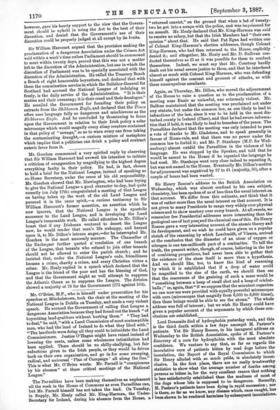Sir Henry Roscoe's address to the British Association on Wednesday,
which was almost confined to his own subject, chemistry, has been spoken of as of less than the usual interest on that account. We differ from this estimate, and think that it was of rather more than the penal interest on that account. It is not given to many Presidents to range very widely over physical science and to show mastery over every branch. At all events, we remember few Presidential addresses more interesting than the geological one of last yea; and the chemical one of this. Sir Henry Roscoe gave a very interesting account of the atomic theory and its development, and we wish he could have given us a popular sketch of the reasoning by which Losclimidt, of Vienna, arrived at the conclusion that the diameter of an atom- of oxygen or nitrogen is one ten-millionth part of a centimetre. To tell the truth, the present writer, though, of course, believing in the law of combining proportions, had never been able to gather that the existence of the atom itself is more than a hypothesis. And we should like, too, to know the kind of reasoning by which it is established that if a drop of water could be magnified to the size of the earth, we should then see that the coarseness of the graining of such a mass would be "something between a heap of small shot and a heap of cricket. balls ;" or, again, that" if we suppose that the minutest organism we can now see were provided with equally powerful microscopes with ours (microscopes that magnify from 6,000 to 8,000 times), then these Wino would be able to see the atoms." The whole address was full of interest; but we wish Sir Henry could have given a popular account of the arguments by which these con- clusions are established.


































 Previous page
Previous page